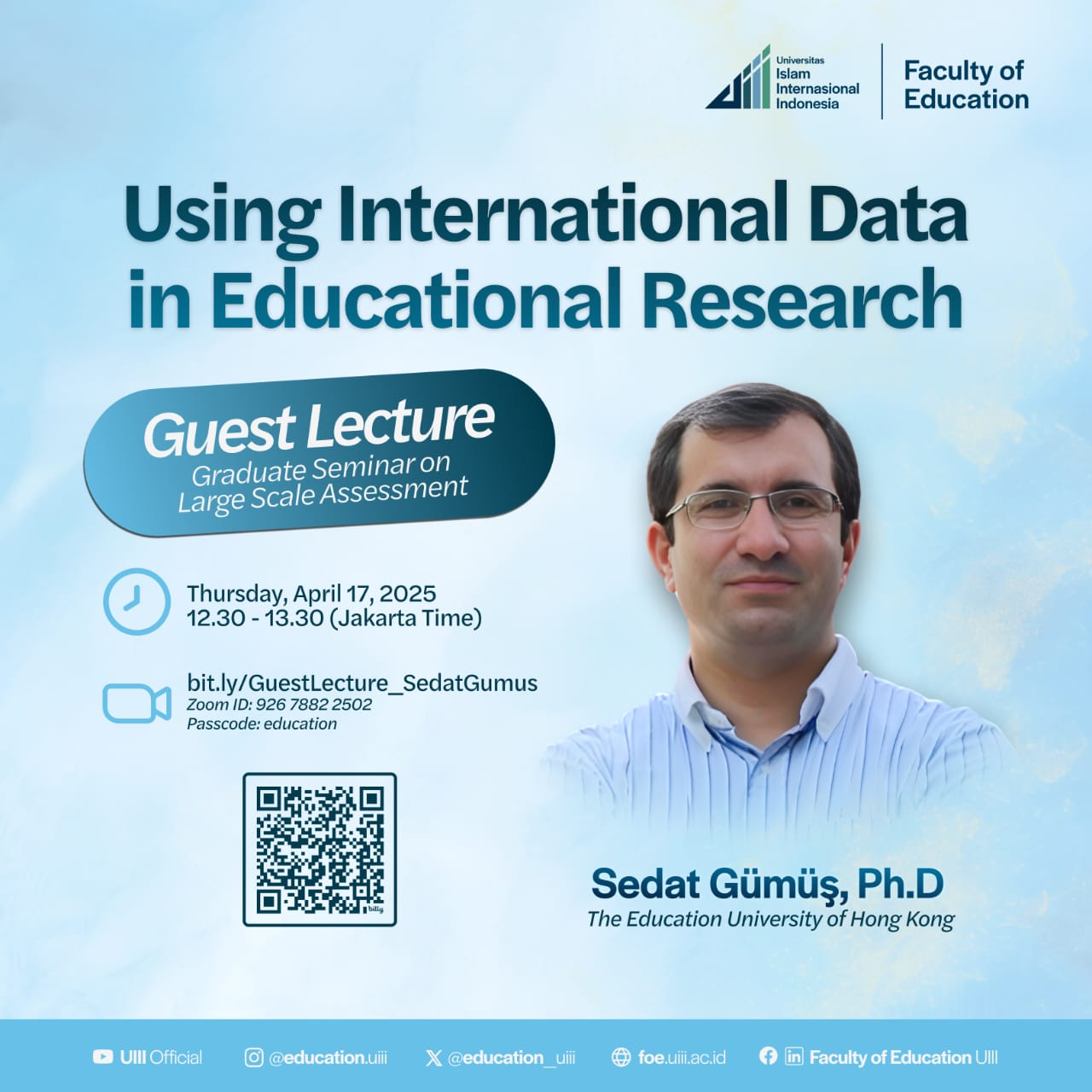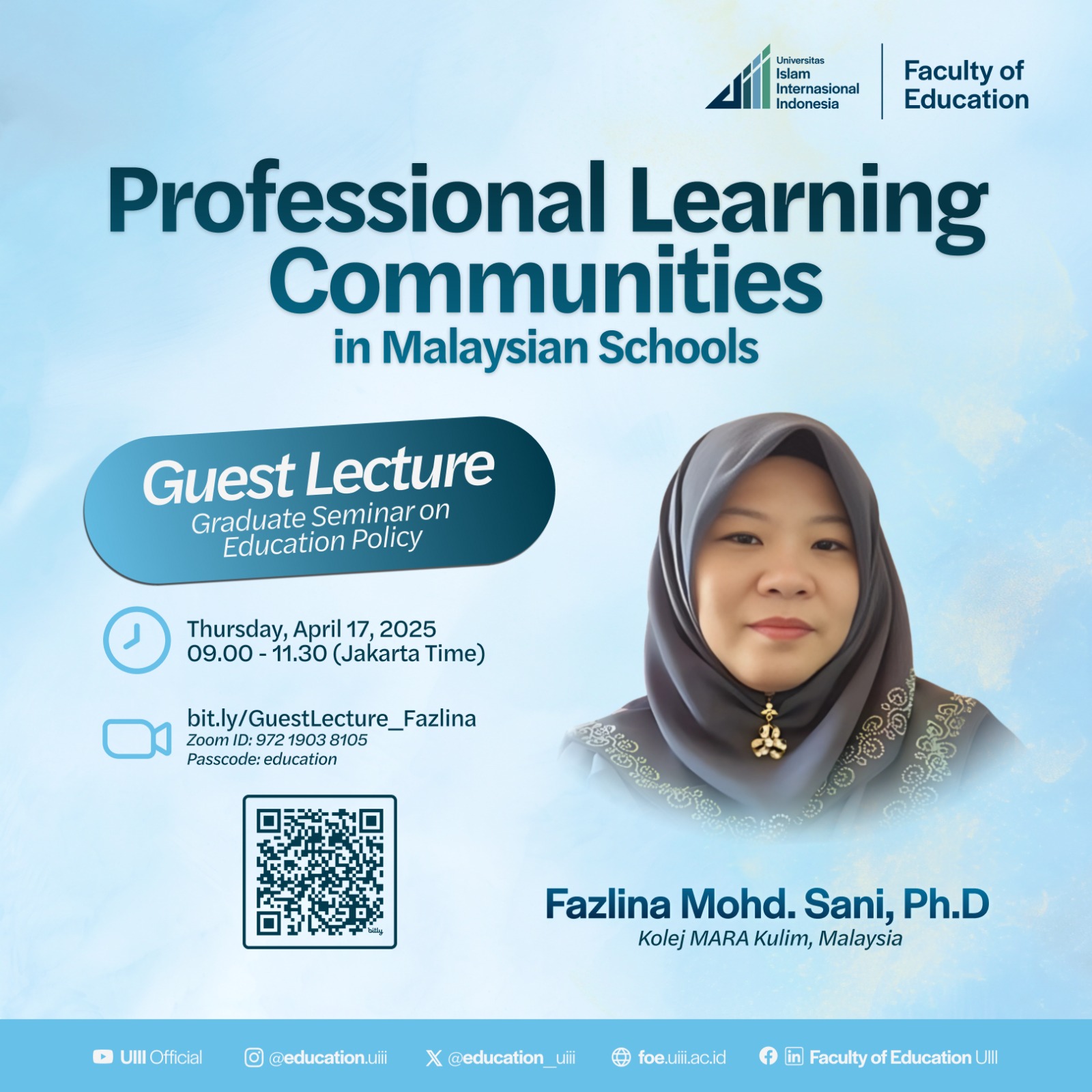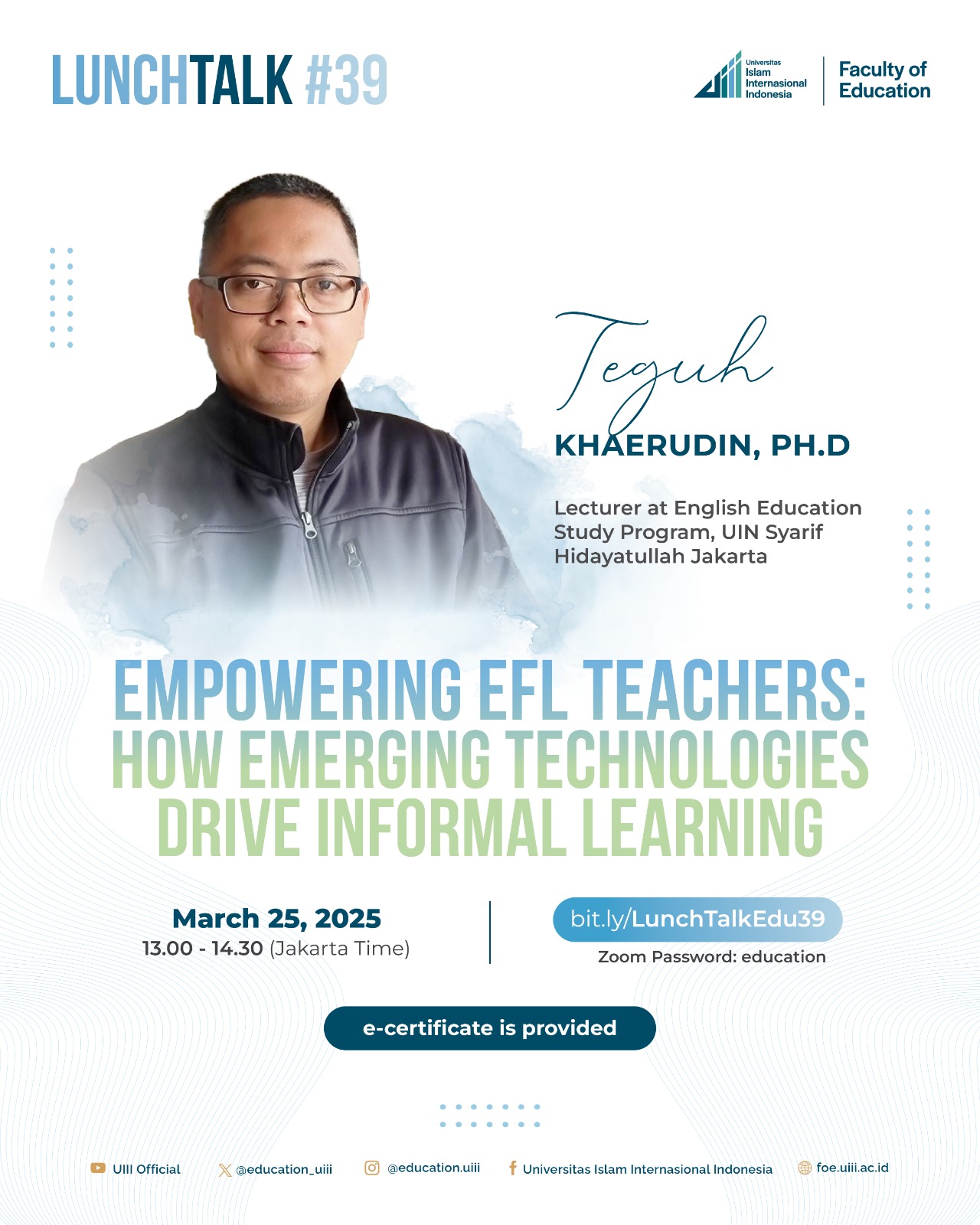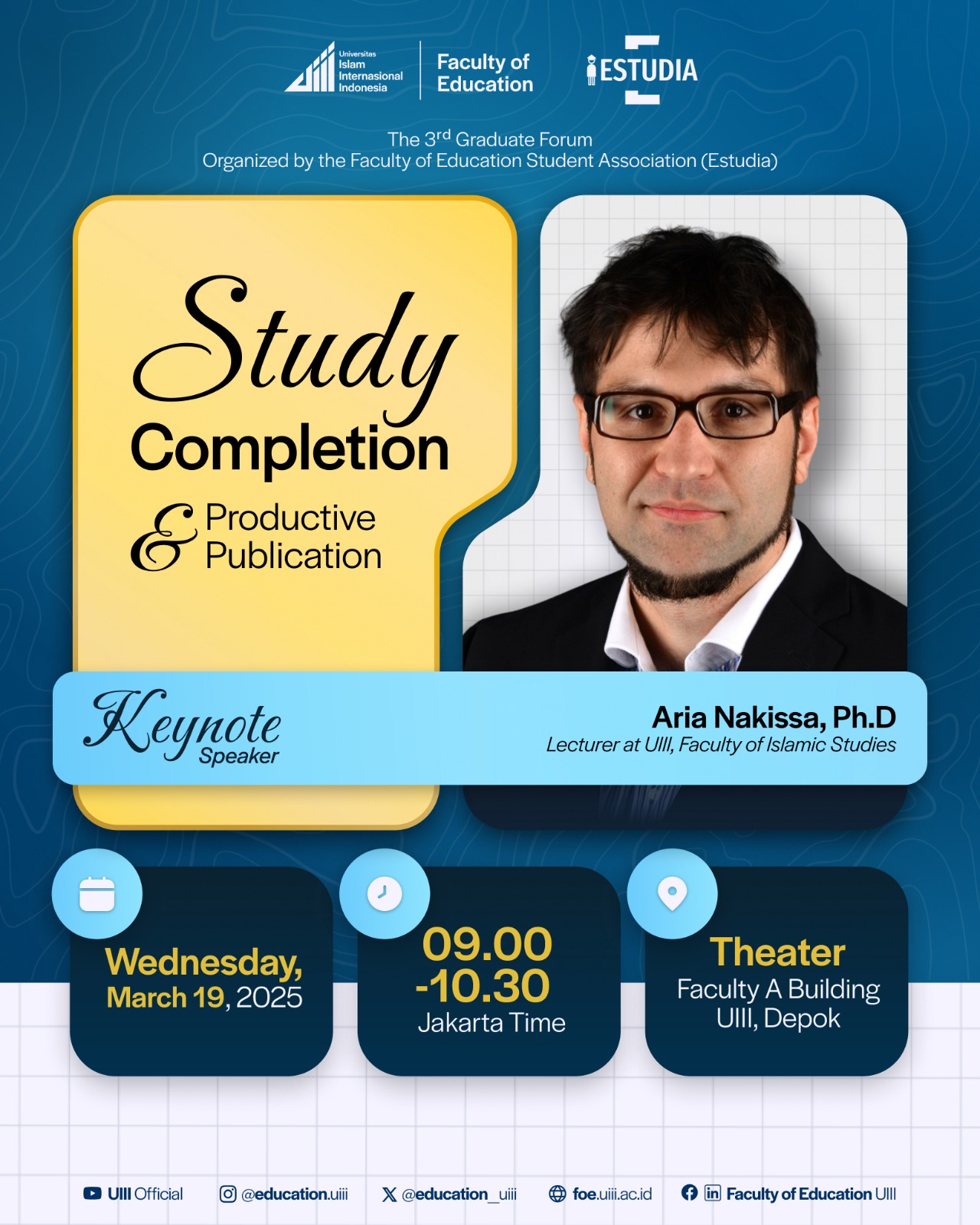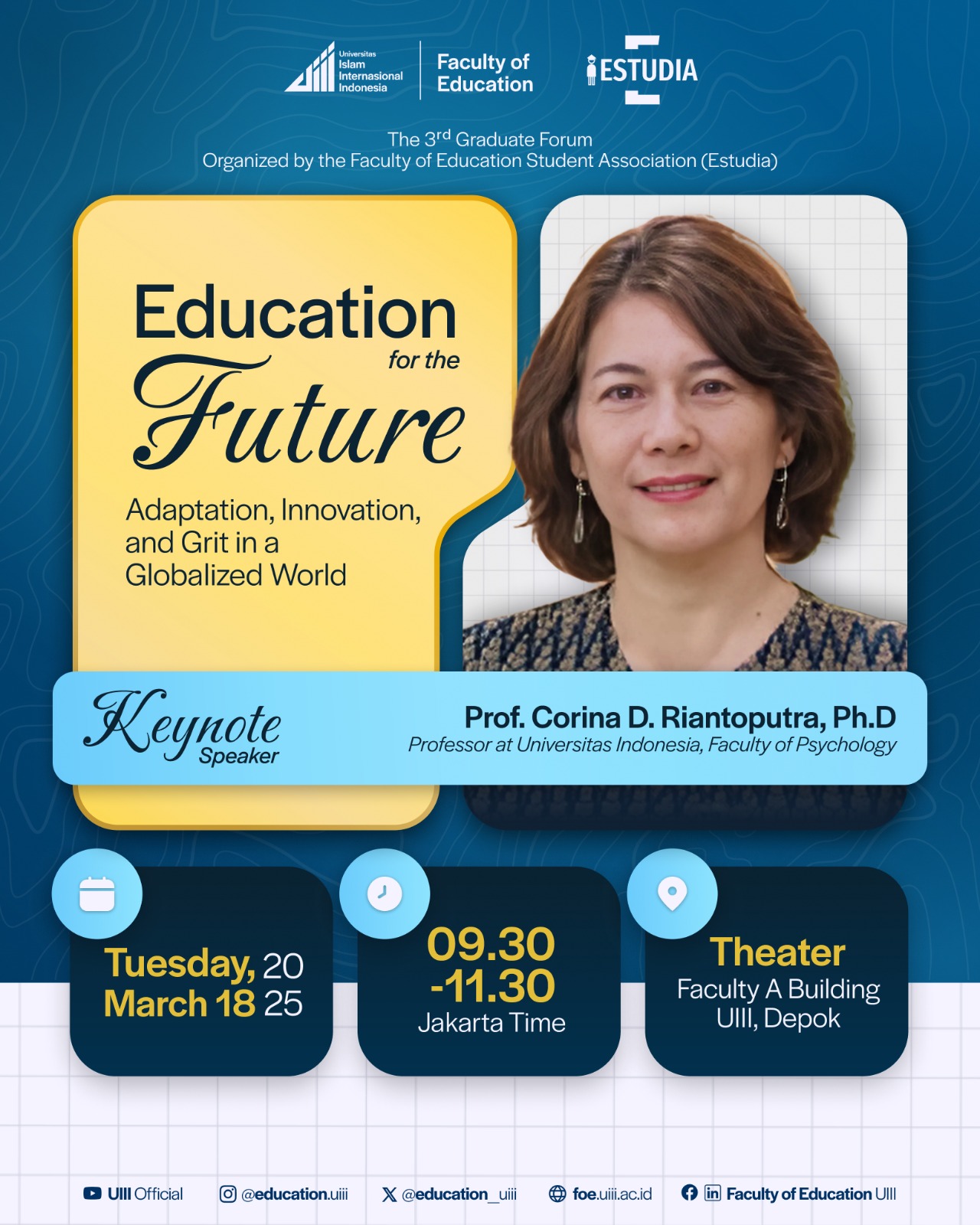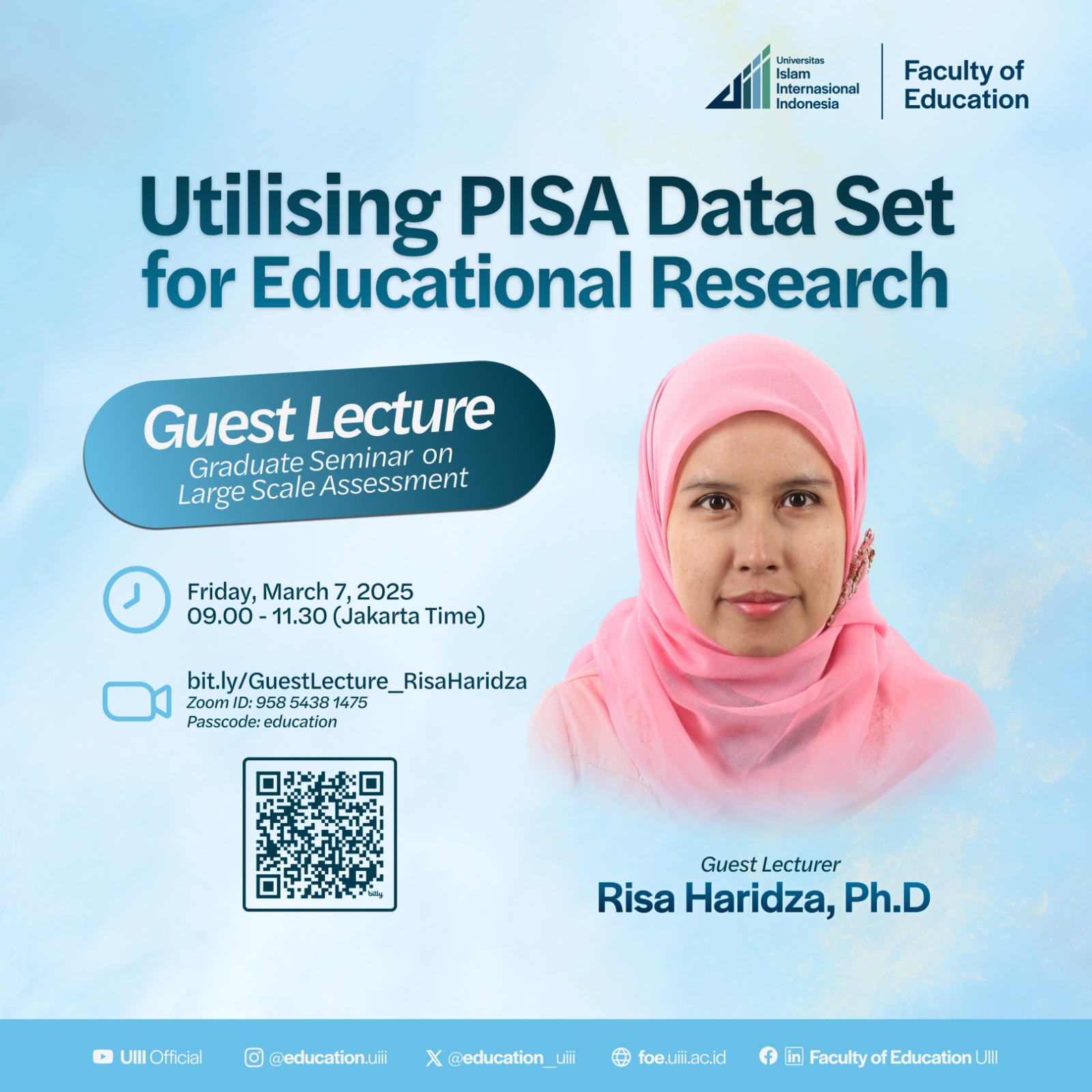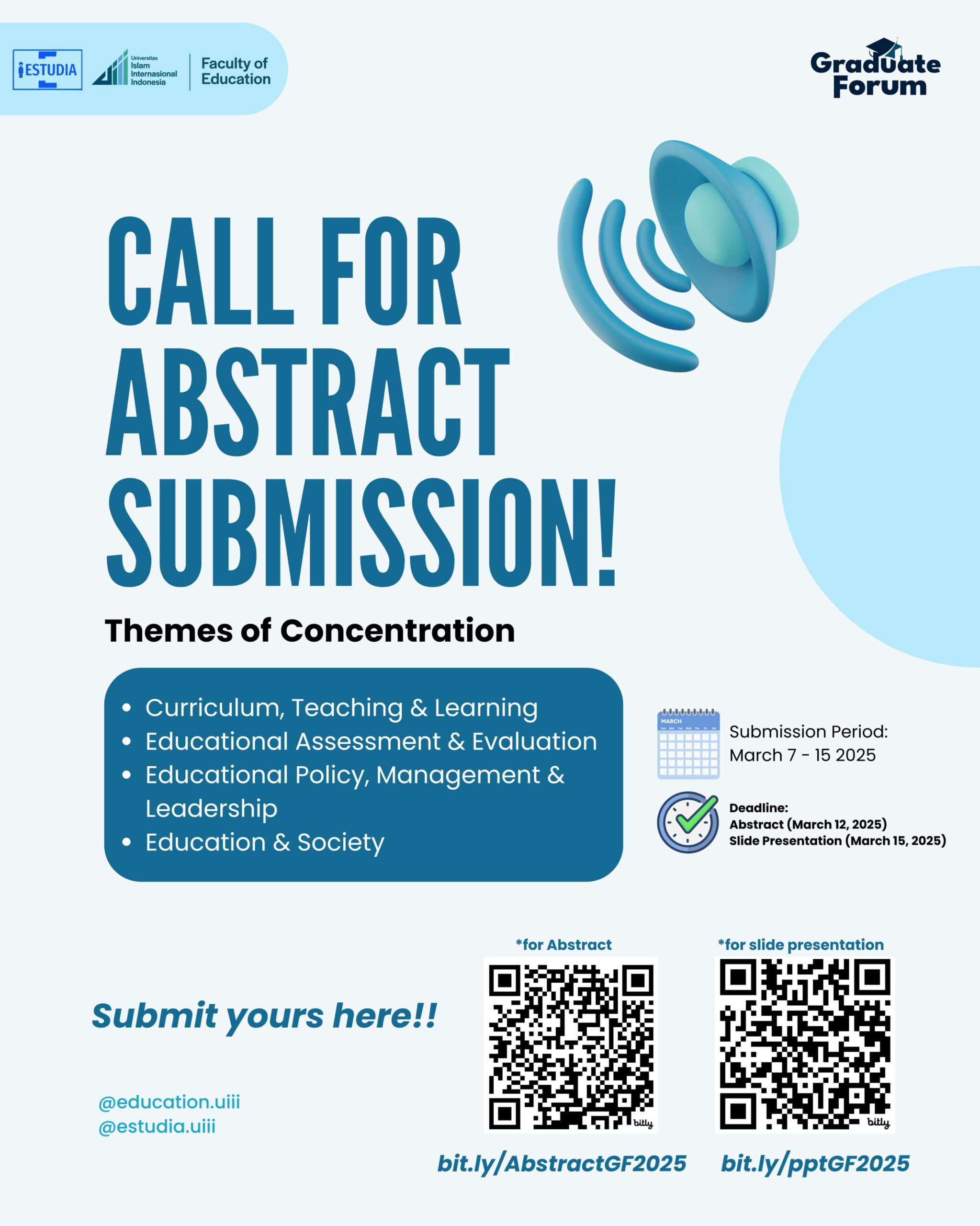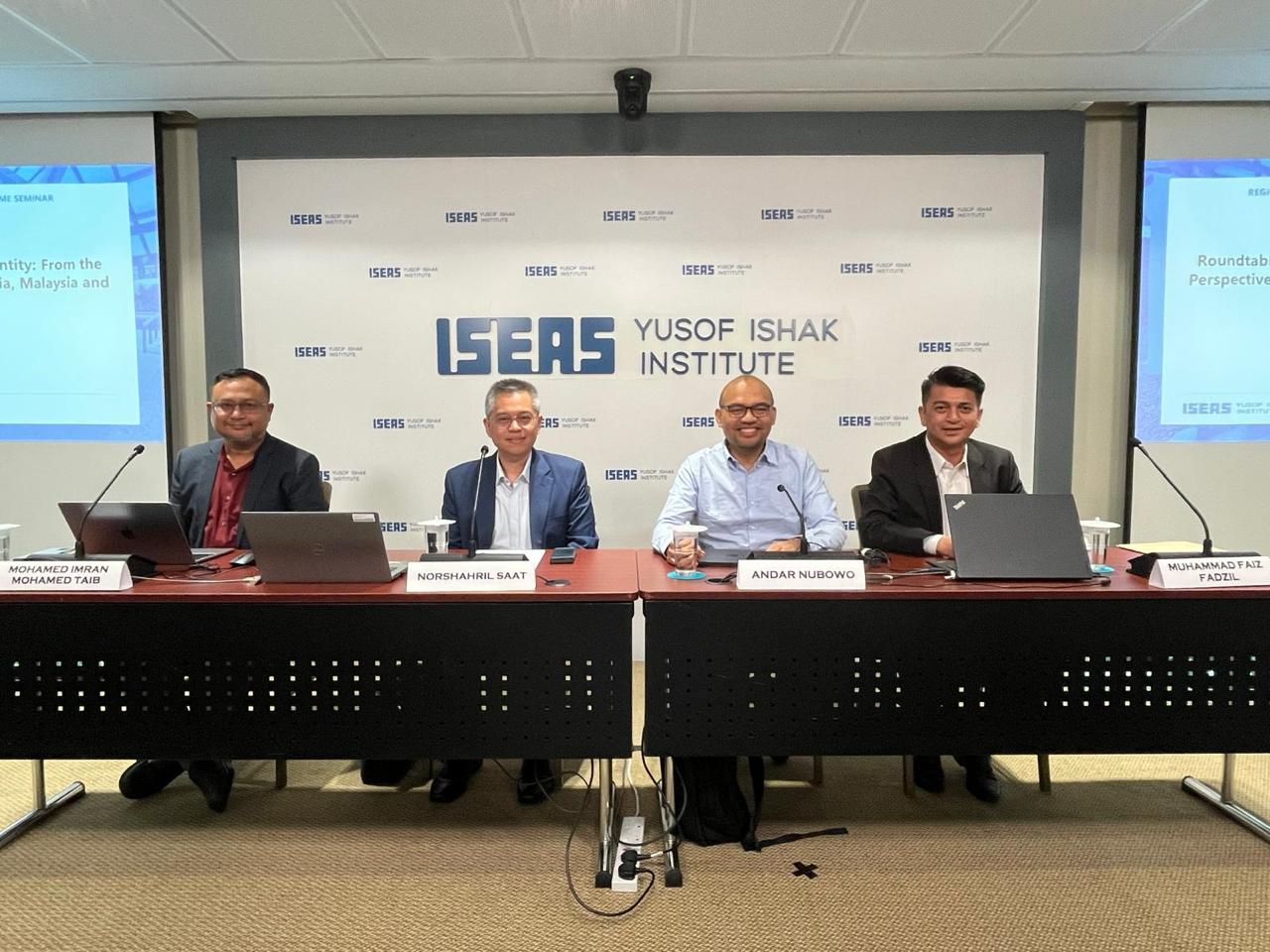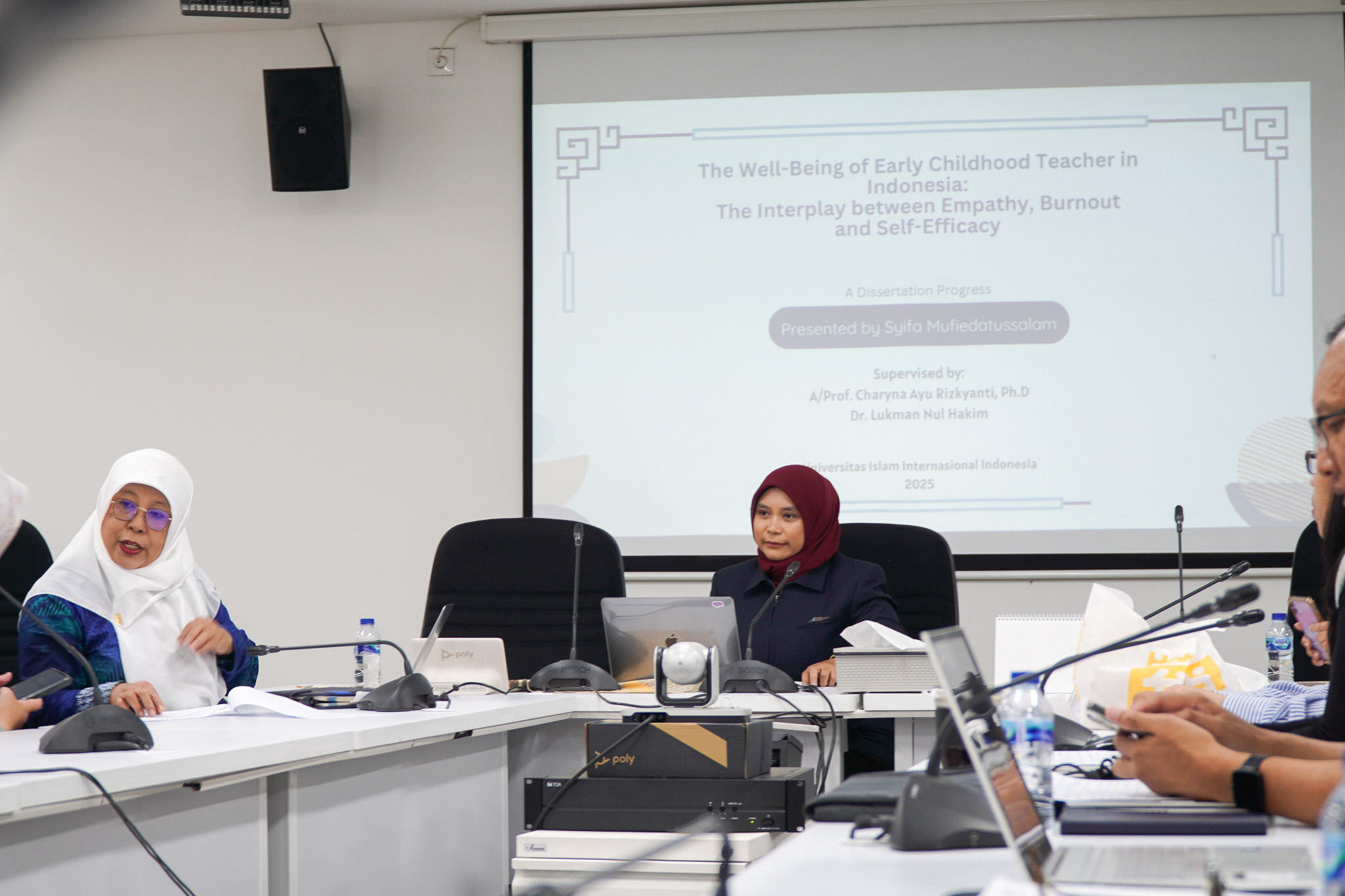Lunch Talk #39: Empowering EFL Teachers: How Emerging Technologies Drive Informal Learning
You are invited to join the Lunch Talk #39 at the Faculty of Education, UIII
Teguh Khaerudin, Ph.D. (Lecturer at English Education Study Program, UIN Syarif Hidayatullah Jakarta) will share about: "Empowering EFL Teachers: How Emerging Technologies Drive Informal Learning".
This Talk explores how English as a Foreign Language (EFL) teachers engage in informal professional learning to enhance their technological knowledge for teaching. Drawing on a qualitative case study of eight Indonesian EFL teachers, the session examines the role of digital tools in shaping teacher learning beyond formal training. Data collected through online observations, interviews, and app analysis reveal that teachers develop their technological knowledge through self-directed engagement with online resources, hands-on experimentation with digital tools, reflective practice, and peer collaboration. The discussion will focus on how these informal learning processes support professional growth, providing teachers with autonomy and flexibility in integrating technology into their classrooms. Participants are invited to share their perspectives and experiences on the evolving role of digital tools in teacher learning.
Day/Date: Tuesday/March 25, 2025
Time: 13.00-14.30 WIB
Zoom Link: https://bit.ly/LunchTalkEdu39
E-Certificate is provided
Thank you!
Graduate Forum and Colloquium 2025

? CALL FOR ABSTRACT AND PPT SUBMISSION!
We are excited to invite you to participate in the upcoming Graduate Forum and Colloquium with the theme:
"Education for the Future: Adaptation, Innovation, and Grit in a Globalized World."
? Submission Period:
▪Abstract Submission: March 7-12, 2025 → bit.ly/AbstractGF2025
▪PPT Slide Submission: March 7-15, 2025 → bit.ly/pptGF2025
? Event Dates: March 18-19, 2025
We invite you to submit the abstract of your paper and presentation slides, highlighting your research and contributions to the field of education. Abstracts should align with one of the following focus areas:
a. Curriculum, Teaching, and Learning
b. Educational Assessment and Evaluation
c. Educational Policy, Management, and Leadership
d. Education and Society
? Important: Please use your UIII email to complete the submission forms.
Islam and National Identity: Dr. Andar Nubowo on Indonesia’s Moderate Islamic Framework

Islam and National Identity: Dr. Andar Nubowo on Indonesia’s Moderate Islamic Framework
By Dadi Darmadi
Singapore, 11 February 2025 — The ISEAS – Yusof Ishak Institute hosted a hybrid roundtable seminar titled “Islam and National Identity: From the Perspectives of Contemporary Indonesia, Malaysia and Singapore,” moderated by Dr. Norshahril Saat, Coordinator of the Regional Social and Cultural Studies Programme. The event featured presentations by Dr. Andar Nubowo (Indonesia), Mr. Muhammad Faiz bin Fadzil (Malaysia), and Mr. Mohamed Imran Mohamed Taib (Singapore), drawing 123 participants—researchers, policymakers, students, and diplomats—both online and in person. This article foregrounds Dr. Andar Nubowo’s analysis of Indonesia’s Islamic identity, enriched by his extensive academic and professional background, alongside insights from his counterparts.
Dr. Andar Nubowo, a lecturer at the Faculty of Education, Universitas Islam Internasional Indonesia (UIII), and the newly appointed Executive Director of the Maarif Institute for Culture and Humanity as of May 2024, brought a wealth of expertise to the discussion. Born on 12 May 1980 in Wonosobo, Indonesia, Dr. Andar earned his Master’s degree in Political Science from École des Hautes Études en Sciences Sociales (EHESS) in Paris (2008) and completed his PhD at École Normale Supérieure (ENS) Lyon in December 2023.
Indonesian National Identity
In his presentation, Dr. Andar provided a historical and contemporary analysis of Islam’s integration into Indonesian national identity. He noted that Southeast Asia has traditionally been viewed as peripheral to the Middle East, long considered the center of Islamic learning. However, he argued that the Reformasi movement of 1998 catalyzed a shift, with Indonesian elites seeking to reposition Indonesian Islam as a significant contributor to global Islamic thought, rooted in local traditions. Tracing Islam’s dissemination in the Malay world from the 13th to 15th centuries—aligned with the decline of the Andalusian Islamic empire and the rise of Sufism—Dr. Andar highlighted the late 19th-century establishment of independent Islamic schools by reformists, diverging from Middle Eastern-influenced pesantren.
The 1990s marked a further evolution, as progressive Muslim intellectuals advocated a moderate Islam contextualized within Southeast Asia. This led to the pribumisasi Islam (indigenization) movement in the 2000s and the embrace of wasatiyyat Islam (moderate Islam) as a national identity framework. Dr. Andar pointed to the Universitas Islam Internasional Indonesia, established under former President Joko Widodo, as a key institutional effort to position Indonesia as a hub for Islamic learning. He concluded that embedding wasatiyyat Islam into social, political, and economic policies is essential for its sustained relevance, a theme consistent with his research on moderate Islam’s soft power diplomacy.
Malaysian and Singaporean Perspectives
Mr. Muhammad Faiz bin Fadzil offered a Malaysian perspective, focusing on Prime Minister Anwar Ibrahim’s Madani framework, which integrates six core values—sustainability, prosperity, innovation, respect, trust, and compassion—to address national unity, economic revival, and political reform. He cited data showing Malaysia’s National Integration Index rising from 0.5 in 2023 to 0.6 in 2024, alongside an improved Global Peace Index ranking from 19th to 10th. Emphasizing wasatiyyah (moderation) as a governance principle, he pointed to initiatives like the Madani Lecture Platform and the “Imam Al-Nawawi’s 40 Hadith” module, while noting challenges such as identity politics.
Mr. Mohamed Imran Mohamed Taib addressed Singapore’s context, examining the Muslim religious elite’s “strategic ambivalence” toward secularism. Defining secularism as the separation of religious and state institutions, freedom of belief, and equal treatment across faiths, he observed its lack of a direct Islamic equivalent. In Singapore, traditionalist skepticism—partly influenced by Malaysia’s Islamist critiques—coexists with pragmatic acceptance of secularism’s role in a multi-religious society.
Nationalism and Global Context
The Q&A session explored nationalism versus the global Muslim ummah, perceptions of secularism, and Islam’s varying national expressions. Dr. Andar, drawing on his leadership within Muhammadiyah’s intellectual networks (e.g., Jaringan Intelektual Muda Muhammadiyah), stressed that while Islam is central to Indonesian identity, its political exploitation must be avoided—a view echoed by his peers. His recent work, such as “Covid-19, Fatwas, and Socio-religious Praxis” (Social Sciences and Missions, 2022), reflects his broader engagement with Islam’s societal role, reinforcing his seminar arguments.
Dr. Andar’s contribution, underpinned by his academic credentials—including awards like the “Bourse d’Islamologie” (2023) and “UIII COMPOSE Writing Fellowship” (2022)—and his leadership at the Maarif Institute, highlighted Indonesia’s deliberate crafting of a moderate Islamic identity. Alongside the Malaysian and Singaporean perspectives, his analysis provided a comparative lens on Islam’s intersection with national identity in Southeast Asia.
Credit: ISEAS – Yusof Ishak Institute
Resilient and Sustainable Education Futures, Insights from Malaysia and Indonesia's COVID-19 Experience

Zainuddin, Z., Sumintono, B. & Perera, C.J. (2025). Resilient and Sustainable Education Futures, Insights from Malaysia and Indonesia's COVID-19 Experience. Springer. https://link.springer.com/book/9789819649709
Overview
- Provides empirical insights into teaching and learning approaches using immersive technologies
- Suggests pedagogical strategies and support for curriculum development and realignment assessment methods
- Serves as a guide for remedial learning solutions and learning continuity relevant to sustainability education
About this book
This book creates awareness about effective and innovative learning using technology tools that can induce more fun and engagement in our present-day learning communities. It explores the post-pandemic educational practices of two countries, Malaysia and Indonesia, and presents reports of empirical evidence concerning the challenges and opportunities that have arisen due to the pandemic. This book also serves as a guide to provide educational practitioners, learners, and researchers with the knowledge required for curriculum development and realignment assessment methods, particularly in post-pandemic education. It provides further insights into advancing post-pandemic education, namely digital learning solutions for sustainable education, alternative assessments for remote education settings, continuous professional development for teachers in the COVID-19 recovery phase, learner engagement in virtual learning environments, and qualitative evidence of teaching and learning during the pandemic. This book serves as a point of reference and a useful resource for developing and underdeveloped countries that need to lean on alternative pedagogies that cater to the group of marginalized learners affected by the pandemic, and aligns with the goals of sustainable education worldwide.
FoE Holds Dissertation Progress Forum for First Batch PhD Students

FoE Holds Dissertation Progress Forum for First Batch PhD Students
February 14, 2025
Contributor: Supriyono | Editor: Dadi Darmadi | Photo: Nurul Fatimah
The UIII Faculty of Education (FoE) recently organized a Dissertation Progress Forum, specially designed for the first batch of PhD students who are currently undergoing data collection. This initiative aims to provide students with a structured timeline and a supportive environment as they progress through their research.
“PhD can be a lonely journey. The aim of this forum is to make you feel that you are not alone, you are being accompanied by your friends and supervisors,” said Prof. Nina Nurmila, the Dean of the Faculty of Education. She emphasized the importance of collective academic growth and peer support throughout the dissertation journey, whilst ensuring that everyone stays on track towards timely graduation.
“We plan to have the dissertation progress seminar every semester,” said Prof. Nina. “It’s essential for PhD students to see each other’s progress and to seek help when needed. We want to create a support system where students can break down their research timeline into smaller, manageable milestones.”
Prof. Nina also stressed the significance of consistent writing and maintaining momentum throughout the dissertation process. She shared personal experiences about balancing academic life and family responsibilities, particularly for those juggling parenthood and research.
Dr. Bambang Sumintono, Head of the PhD Programs, also shared insights on the importance of structured research progress and maximizing academic opportunities. “We structure this seminar to ensure that students present their progress at different stages—midway, near the end, and at the final stage. This helps students stay on track with their writing and research goals,” he explained.
Dr. Bambang also encouraged students to present their research in the forum concisely, emphasizing that a skill that a researcher must have is to explain their research in a simple and short way. “We also expect critical questions, as this is common in academic settings. Learning to respond to scepticism is part of becoming a strong researcher,” he said.
The seminar aligns with the Faculty of Education’s tradition of fostering a strong academic community where students support each other. “We want students to graduate together. No one should not be left behind,” Prof. Nina emphasized. “Each batch should progress as a cohort, helping one another along the way.”
The Dissertation Progress Seminar will continue to be a recurring event at UIII’s Faculty of Education, ensuring that PhD students remain engaged, motivated, and supported throughout their research journey.
By providing structured guidance and fostering a collaborative academic atmosphere, the Faculty of Education is committed to helping students achieve success in their doctoral studies.


